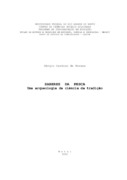Please use this identifier to cite or link to this item:
https://repositorio.ufrn.br/handle/123456789/14128| Title: | Saberes da pesca: uma arqueologia da ciência da tradição |
| Authors: | Moraes, Sergio Cardoso de |
| Advisor: | Almeida, Maria da Conceição Xavier de |
| Keywords: | Educação social;Saberes da tradição;Cognição;Social Education;Knowledge obteined through tradition;Fishing;Cognition |
| Issue Date: | 13-May-2005 |
| Publisher: | Universidade Federal do Rio Grande do Norte |
| Citation: | MORAES, Sergio Cardoso de. Saberes da pesca: uma arqueologia da ciência da tradição. 2005. 230 f. Tese (Doutorado em Educação) - Universidade Federal do Rio Grande do Norte, Natal, 2005. |
| Portuguese Abstract: | A tese apresenta e discute saberes pautados pela tradição compreendidos como saberes construídos ao longo das gerações, transmitidos a partir da oralidade e das experiências do cotidiano - frutos de um conhecimento não-científico que tem por base a observação e as orientações das gerações mais experientes. O ícone de referência usado para tecer a discussão em tese é a pesca. Ressaltamos os conhecimentos que permitem ao pescador, entre outros domínios: descobrir os hábitos alimentares dos peixes e de outros animais; orientar-se através dos astros durante a navegação noturna e conhecer o fluxo das marés orientadas pelo ciclo lunar. Em se tratando de saberes da pesca, a pesquisa foi organizada a partir de um levantamento bibliográfico sobre diversas formas de pescarias nas regiões Norte, Nordeste, Sul e Sudeste. Nas regiões Norte e Nordeste foi enfocada, também, a pesquisa de campo. Balizada por entrevistas, registros fotográficos e filmagens, esta parte da pesquisa compôs-se de duas etapas: a primeira situada na Amazônia - numa área denominada Baixo-Tocantins - no Estado do Pará, onde trabalhamos com pescadores dos municípios de Abaetetuba e Igarapé-Miri; a segunda desenvolveu-se na região Nordeste, no Estado do Rio Grande do Norte, onde desenvolvemos trabalhos com os pescadores da Lagoa do Piató, no município de Assú. Começamos a discussão através de um levantamento descritivo das técnicas de pesca, a fim de identificá-las como uma atividade ordenada, diferenciada e classificada mediante um conhecimento construído ao longo dos anos, permeada pela relação entre homem e natureza. A criatividade, aguçada pela curiosidade humana, é também discutida e exemplificada a partir de várias pescarias. Os mitos, enquanto parte integrante do mundo da pesca, preferencialmente os que tratam da relação entre homens e águas, também recebem destaque. Por fim, duas técnicas de pesca pertencentes ao referencial da pesquisa de campo são descritas e analisadas sob o foco da construção e sistematização dos saberes que envolvem a pesca. A abordagem teórica tem como base uma reflexão sobre os saberes da tradição referenciados por Almeida (2001), Balandier (1997), Câmara Cascudo (1957, 2000, 2002) e Claude Lévi-Strauss (1976, 1987 e 1991). A tese se constitui num exercício de produção do conhecimento que propugna pela religação dos saberes, como sugere Edgar Morin no âmbito das ciências da complexidade |
| Abstract: | This essay presents and discusses knowledge obtained through tradition taken as knowledge built along generations, transmitted from mouth to mouth and everyday experiences result of a non-scientific knowledge based on observation and hints given by more experient generations. The referred icon used to develop such a discussion in this essay is fishing. We point out the knoledge which enables the fishermen, among other dominions, to: find out the fish and other animals feeding habits; find their way through by astral influence during night navigation and learn the tide flowing based on the moon cycle. On what comes to fishing knowledge, the research was organized based on a bibliographic study about several ways of fishing in the Northern, Northeastern, Southern and Southestern regions of Brazil. In the Northern and Northeastern regions, the field research was also focused. Having interviews, photographs and films as reference, this part of the research was divided into two parts: the first one situated in the Amazonian Region in na area called Baixo-Tocantins, in the State of Pará where we worked with fishermen in the small towns of Abaetetuba and Igarapé-Miri; and the second one was held in the Northeastern region of Brazil, in the State of Rio Grande do Norte, where we worked with fishermen on the Piató Lake, in the small city of Assú. We tarted discussing based on a descriptive study of the fishing techniques used, aiming to identify them as an ordered activity, differed and classified by knoledge obtained through the years, based on the relationship between man and Nature. Creativity, stimulated by human curiosity, is also discussed and shown as a result of various fishing journeys. The myths, as a component of the fishing world, especially those which describe the relationship between men and waters, also have an outstanding place. At last, two fishing techniques belonging to the research field reference, are also described and analysed under the focus of construction and systematization of the knowledge related to fishing. The theory approach is based on reflection upon the tradition knowledge discussed by Almeida (2001), Balandier (1997), Câmara Cascudo (1957, 2000, 2002) and Claude Lévi-Strauss (1976, 1987 and 1991). The essay is an exercise of knowledge production which defends the "relink" of knowledge, as Edgar Morin suggests when dealing with the sciences of complexity |
| URI: | https://repositorio.ufrn.br/jspui/handle/123456789/14128 |
| Appears in Collections: | PPGED - Doutorado em Educação |
Files in This Item:
| File | Description | Size | Format | |
|---|---|---|---|---|
| SergioCM.pdf | 1,95 MB | Adobe PDF |  View/Open |
Items in DSpace are protected by copyright, with all rights reserved, unless otherwise indicated.

